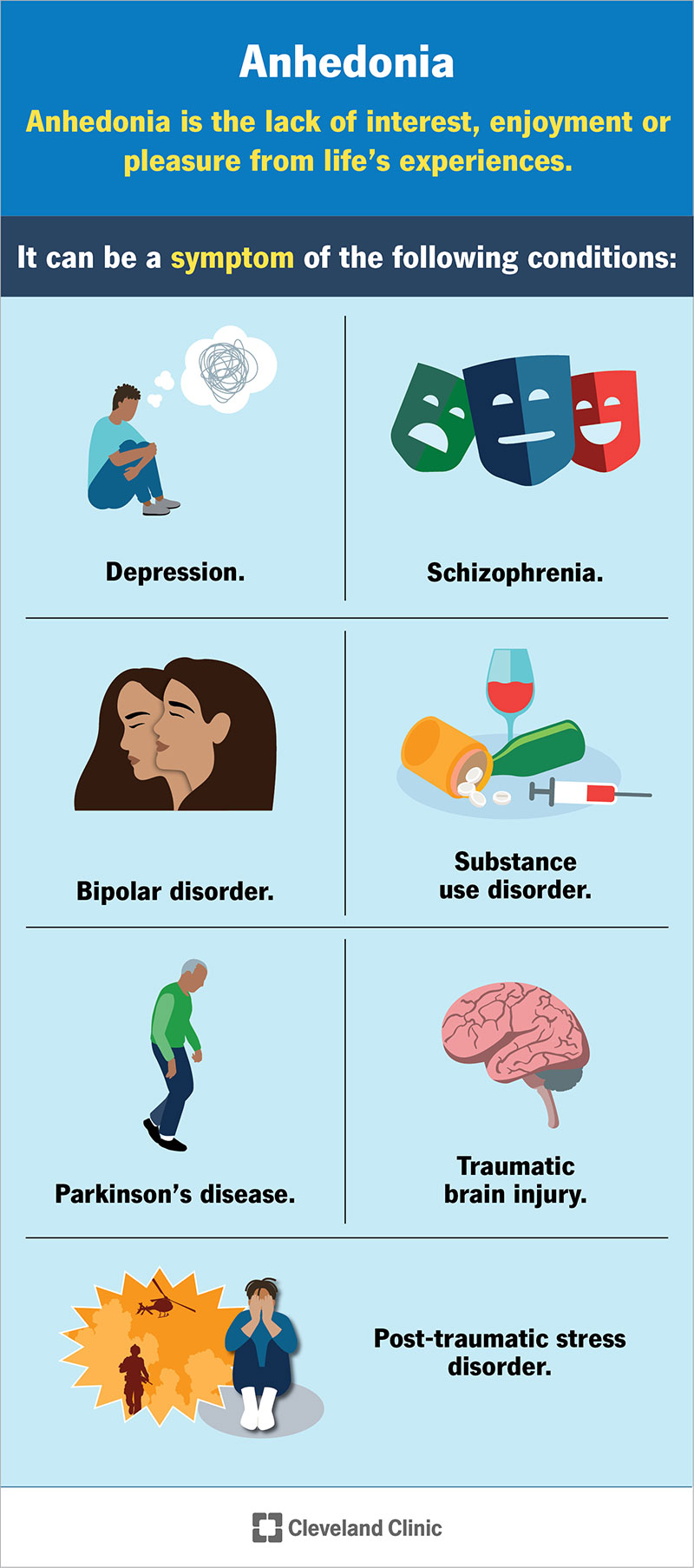Anhedonia is the inability to experience joy or pleasure. You may feel numb or less interested in things that you once enjoyed. It’s a common symptom of many mental health conditions like depression. Treatment is available to help you regain interest in life’s activities, like being around loved ones or listening to music.
Advertisement
Cleveland Clinic is a non-profit academic medical center. Advertising on our site helps support our mission. We do not endorse non-Cleveland Clinic products or services. Policy

Image content: This image is available to view online.
View image online (https://my.clevelandclinic.org/-/scassets/images/org/health/articles/25155-anhedonia)
Anhedonia is the lack of interest, enjoyment or pleasure from life’s experiences. You may not want to spend time with others or do activities that previously made you happy. Anhedonia is a common symptom of many mental health conditions.
Advertisement
Cleveland Clinic is a non-profit academic medical center. Advertising on our site helps support our mission. We do not endorse non-Cleveland Clinic products or services. Policy
It’s normal when your interests change throughout your life. With anhedonia, you get much less pleasure or joy doing things you like to do.
There are two types of anhedonia:
If you experience anhedonia, you may not “feel” — like there’s an emptiness where you expect your feelings to be. It may feel as if you’re being followed by a dark cloud that’s blocking the sunlight. This can take the form of:
In addition, you may have trouble sleeping, which can affect your mood and ability to accomplish your daily routine. It can also affect your sex drive or libido.
You may have trouble spending time with people. You may feel like you have nothing to give, whether that’s love, affection or appreciation. This can lead to social isolation or social anxiety disorder.
No. While you may experience both anhedonia and apathy at the same time, they’re not the same. Anhedonia is the lack of enjoyment or pleasure. Apathy is a lack of energy or motivation to do things.
Advertisement
Anhedonia can be a symptom of the following conditions:
Research is ongoing to learn more about the causes of anhedonia. Studies suggest that it could result from a lack of activity in your brain’s ventral striatum. This area of your brain sits above and behind your ears. It contains the “pleasure center” of your brain that receives and produces dopamine. Dopamine is the “feel-good” hormone. A change to the activity in this area of your brain can affect how you perceive rewards, like being around other people or participating in certain activities.
A healthcare provider will look for the symptom of anhedonia by asking you questions about how you feel emotionally and your mood. They may also perform a physical exam to rule out any other physical conditions. They’ll also take a complete medical history during the exam.
Since anhedonia can link to depression, a healthcare provider may recommend getting blood tests to determine or rule out any underlying conditions that can affect your mental health. This may include:
There isn’t a specific treatment for anhedonia. A healthcare provider will help alleviate this symptom by diagnosing and treating the cause or underlying condition. Possible treatments could include:
You may need to combine treatments, like medication and cognitive behavioral therapy. Let your healthcare provider know if you have any side effects like suicidal thoughts while starting a new treatment. You may need to continue your treatment even if you feel better so anhedonia doesn’t return.
Your healthcare provider or a mental health professional may make recommendations to help you alleviate anhedonia at home. For example, your provider may suggest you exercise regularly, like taking a walk or doing yoga. When you engage in physical activities, your body releases dopamine. Since anhedonia affects your body’s dopamine levels, exercising can help your body release more dopamine to activate your brain’s “pleasure center.”
Untreated anhedonia can affect both your mental and physical health. Possible risks of not treating anhedonia and its underlying cause may include:
Advertisement
If you experience suicidal thoughts, contact a healthcare provider or call 988 (Suicide & Crisis Lifeline). If you feel you’re in immediate danger, contact 911 or your local emergency services number.
There’s no known way to prevent anhedonia.
Anhedonia can go away or get better under the supervision of a healthcare provider and/or a mental health professional. It doesn’t go away on its own. You should start feeling better once you begin treatment. Anhedonia may come back after treatment. You can reduce your risk of the symptom recurring by following your healthcare provider’s treatment plan, even if you feel better.
If you don’t feel joy or pleasure as you once did, contact a healthcare provider. Anhedonia can affect your mental and physical health. A healthcare provider and/or a mental health professional can help you reduce this symptom so you can feel better sooner.
Anhedonia can interfere with your ability to enjoy the little things, like eating your favorite food or giving a hug to a loved one. You may feel frustrated that you no longer find pleasure in things that once made you happy. While there are many possible causes of this symptom, a healthcare provider and/or a mental health professional can help you navigate your diagnosis and treatment options. If you experience suicidal thoughts, contact 988 or your healthcare provider.
Advertisement

Sign up for our Health Essentials emails for expert guidance on nutrition, fitness, sleep, skin care and more.
Learn more about the Health Library and our editorial process.
Cleveland Clinic’s health articles are based on evidence-backed information and review by medical professionals to ensure accuracy, reliability and up-to-date clinical standards.
Cleveland Clinic’s health articles are based on evidence-backed information and review by medical professionals to ensure accuracy, reliability and up-to-date clinical standards.
Your mental well-being is just as important as your physical well-being. Cleveland Clinic’s mental health experts can help you live life to the fullest.
